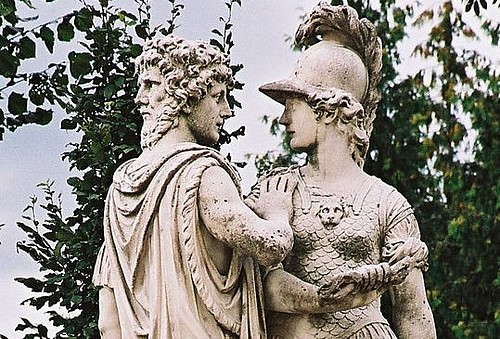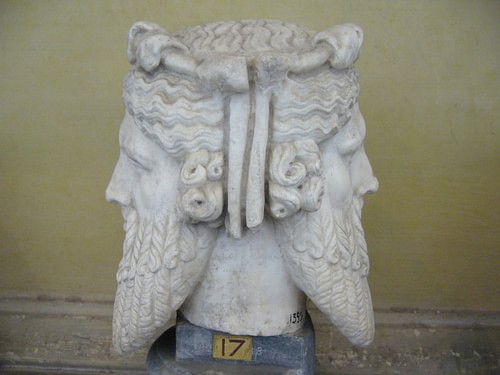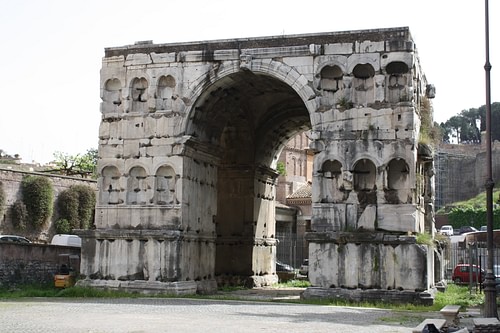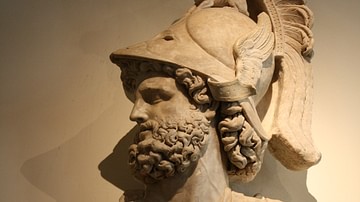
The Roman Republic owed much to the cultural influence of its Greek neighbors. For centuries the Greeks occupied a prominent position to the south on the island of Sicily. A series of wars in the 2nd and 3rd centuries BCE brought to the city a tremendous Hellenic presence: art, literature, philosophy, and most significantly, religion. Although a rich religious tradition had existed long before the arrival of the Greeks, the pantheon of Greek gods quickly merged with those already present. However, there was one god with no Greek counterpart — one who symbolized both beginning and end. His name was evoked even before that of Jupiter. His name was Janus.
Despite the influence of these newly arrived gods, there was one significant difference between Greek and Roman worship: the importance of rituals. To the Romans rituals were extremely important. They were a veiled attempt to avoid the dangers of religious zeal. If a ritual were performed properly, an individual would be rewarded; if not, he could be punished. This reliance would continue long after the arrival of the Greek pantheon.
Roman Rituals & Gods
Initially, even before the Capitoline triad, Roman religion was based on the cult of the household — a belief that spirits or numina inhabited everything around them, people included. There was an array of domestic deities: Vesta, the spirit of the hearth (later to be associated with the Vestal Virgins); Penates, the guardians of the pantry (later protectors of the Roman state); Lar Familiaris, the spirit of the cultivated land (also the guardian of the family fortune); and lastly, Janus, the spirit of the doorway or ianua. Although usually benign, these spirits could be angered, especially if ignored. Every home contained a small cupboard containing their images and a small portion of each meal honored them. Eventually, many of these household spirits became state deities.
Janus' Legend & Attributes
Janus was one of the earliest of the Roman deities, sometimes referred to as the “god of gods” or diuom deo; others equated him with the Etruscan god Culsans. However, there are at least two notable myths concerning his origin. And, according to both, unlike other Roman and Greek gods, Janus may have actually lived. In the first myth, he ruled alongside an early Roman king named Camesus. After Janus' exile from Thessaly (a province in northern Greece), he arrived in Rome with his wife Camise or Camasnea and children, the most notable being Tiberinus (god of the Tiber). Shortly after arriving, he built a city on the west bank of the Tiber named Janiculum. Following the death of Camesus, he ruled Latium peacefully for many years. He supposedly received Saturn when the god was driven from Greece. Upon his own death, Janus was deified. The second myth has him present at the time of Romulus, the founder of Rome. Following Romulus's kidnapping of the Sabine women, Rome was attacked. As the enemy, under the leadership of Titus Tatius, scaled the walls of the city, Janus launched a powerful jet spray of hot water, forcing them to retreat. To celebrate this deed the doors of the Temple of Janus at the Forum are always left open so he can assist the Roman soldiers in time of war. Allegedly, Romulus established a cult honoring Janus.
According to some, he was the custodian of the universe but, to all Romans, he was the god of the beginnings and the ends, presiding over every entrance and departure, and because every door and passageway looks in two directions, Janus was seen as two-faced or Janus bifrons — the god who looked both ways. He was the gatekeeper; his symbols were a porter's staff or virga and a set of keys. To illustrate his importance, his name was even mentioned before Jupiter in prayers. He protected the start of all activities. He inaugurated the seasons. The first day of each month was considered sacred to him but the first month of the year — January — which many in the present day consider named in his honor — was actually named for Juno, queen of the gods. Early Romans coins featured his image, showing him as two-faced, one bearded and one clean-shaven. Later, during the Renaissance, this image of two faces would represent not only the past and future but also wisdom.
Closing the Doors to Janus' Shrines
There were five shrines built to honor Janus Geminus in Rome, all of which were located near crossings of rivers or watercourses, owing to his early connections to water and bridges. The most important of these shrines was near the Argiletum entrance to the Forum. This particular shrine had bronze doors on the east and west sides, and according to tradition, the doors were kept closed in times of peace and open in times of war. However, since the Romans seemed to always to be at war somewhere, the doors were almost never closed. Also important was the manner in which the army left to wage war; they had to exit the city according to ritual in order to be protected by Janus. Failure to do so could result in defeat.
In January of 48 BCE, during the time of Julius Caesar, the Roman Senate authorized a ceremony (augurium salutis) when the temple doors were finally closed — a symbol that Caesar's victories had finally brought peace to the Republic. This would not be the last time an emperor would close the doors. Early in his reign, Emperor Augustus opted to continue many of the old religious traditions and rituals in an attempt to reinvigorate the worship of the old gods and get away from cults and foreign gods. He rebuilt many of the old shrines and temples that had fallen into disrepair. Because of this, during Rome's war in Spain in 26 BCE, the army continued the practice of exiting correctly through the doors of Janus' shrine. These doors were ceremoniously closed upon their successful return seven years later.
The Greeks had a tremendous influence on Rome: its culture, its self-image and, of course, religion. However, one often forgets that there was religion in Rome prior to this contact. There was, however, a dramatic shift. Roman gods became more Greek, that is, more human-like with all of the foibles of humankind: love, hate, jealousy, etc. However, there was one god who never changed; he was the beginning and the end. He had no Greek counterpart. He was uniquely Roman. He was Janus.











